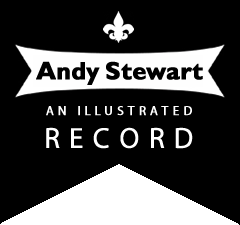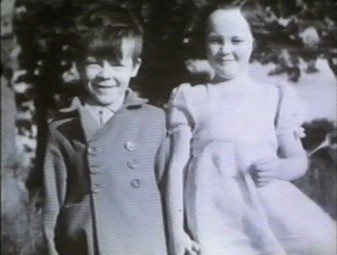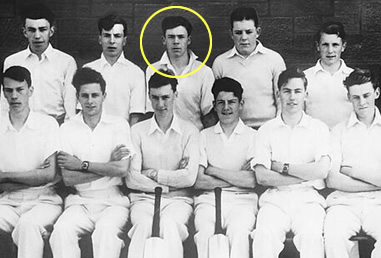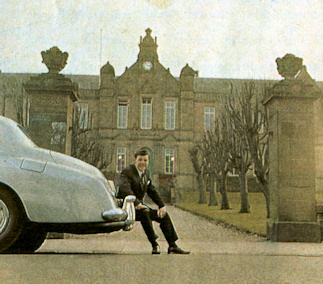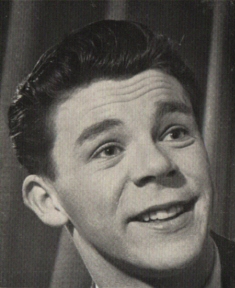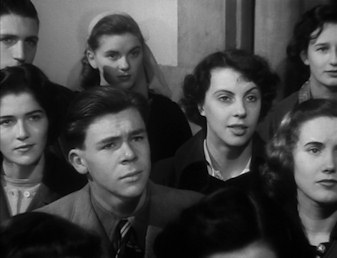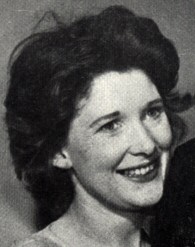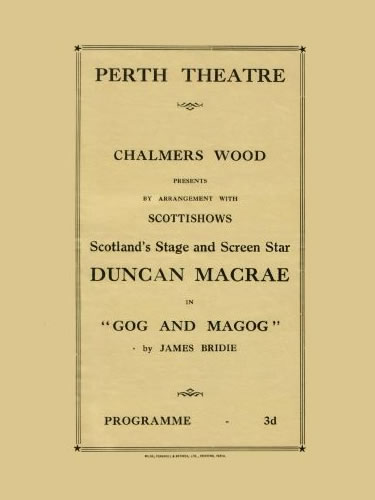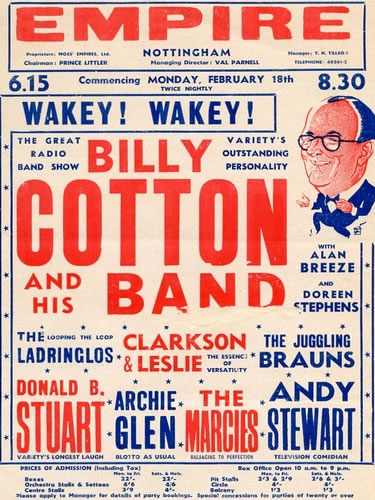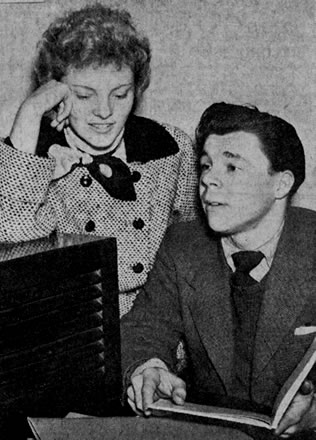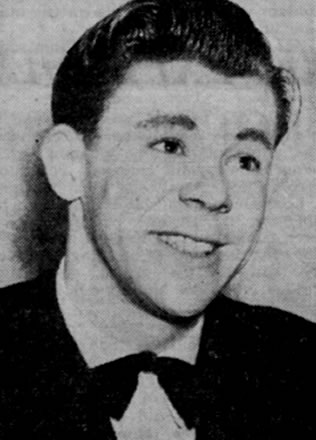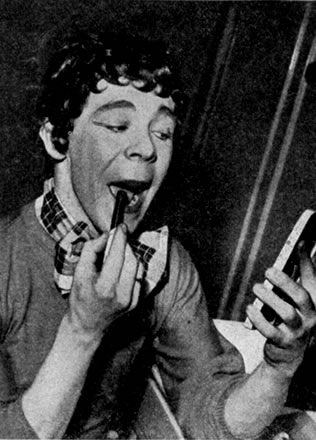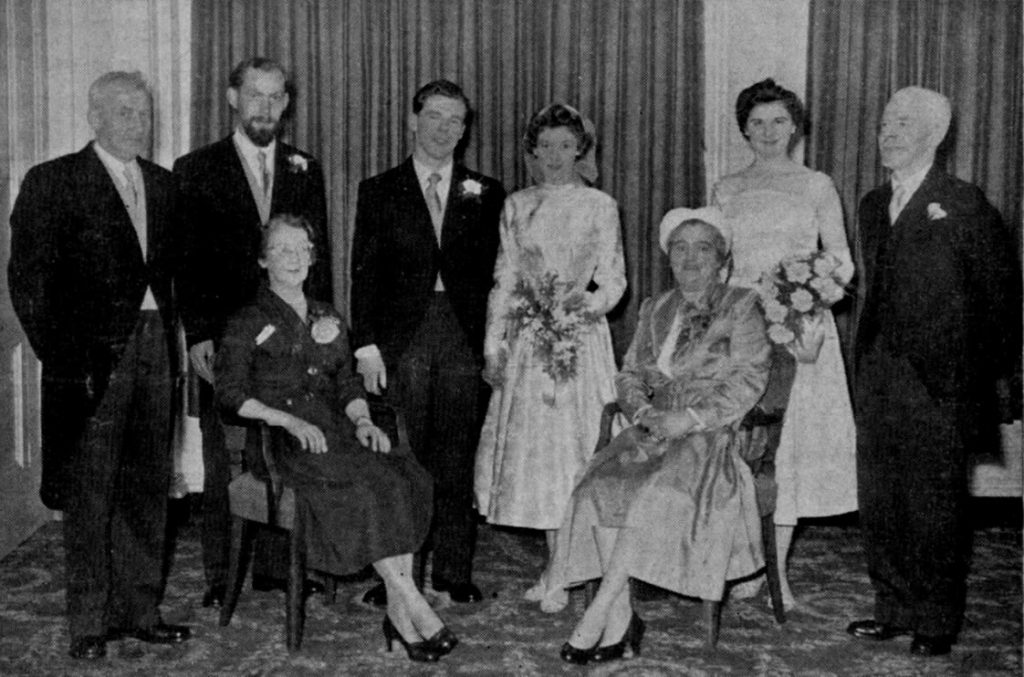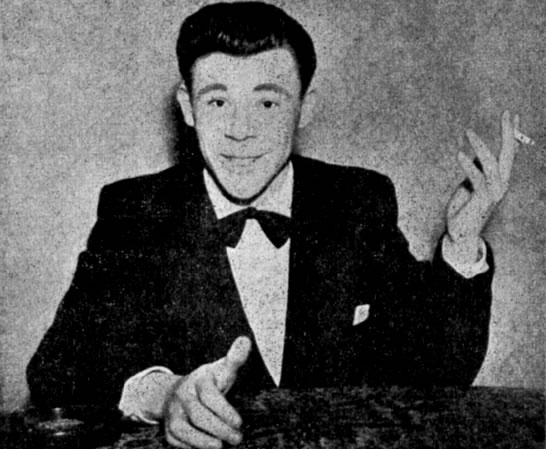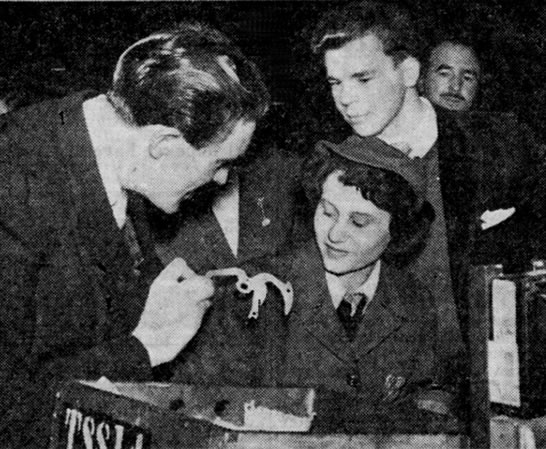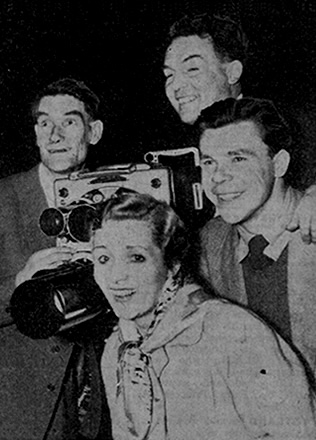“I said: Will I get on the stage much? They said No, most of the time you’ll be making tea… So I decided to make my own way in Variety”
Andy Stewart: The Early Years
Andrew (Andy) Stewart was born on the 30th December 1933 at Redlands Hospital for Women, Great Western Road, Glasgow, the youngest child to Andrew Stewart, a school teacher and his wife Alice (nee Thomson), the family residing in the Linthouse area of Glasgow. Aged five Andy began his schooling at Drumoyne Primary School, then in 1939 a move to Perth saw Andy attending Craigie School, and Perth Academy as his father took up the position as teacher of rural science. In 1945 when Andy was aged twelve, his father secured another new position, this time as Assistant Teacher of Science at Arbroath High School and the following year Mrs Stewart with her son and daughter Moira came to make their home in Arbroath. The Stewart family had a history in the North-East burgh. Andy’s maternal grandfather Alfred Thomson was a native of Arbroath and although leaving for Glasgow many years before, the old home town had remained a favourite place for annual holidays. This time the Stewart family move would prove to be permanent and, the family settled, Arbroath became Andy’s adopted home town.
Andy was born into a musical family. With both his mother and father playing violin and his sister Moira learning piano it seemed only natural that Andy would have musical ability. However even at this early age a vocal dexterity he would become known for began to display itself, as he found it far easier to impersonate an instrument such as a trumpet with his voice, than it was to actually learn to play it.
During the war years Andy’s mother would run garden fetes and charity shows to raise money for the Red Cross. Young Andy was the “star-turn” singing For Me and My Gal with his sister, but show business was not yet his goal in life. Andy had ambitions to be a veterinary surgeon and spent most school holidays working on farms around Arbroath. It was in this environment that Andy would first hear songs known as ‘Bothy Ballads’ sung by local farm-hands. Unknown to him, these particular songs would form the basis of his professional career and play an immensely important part in his life.
Arbroath High School
Andy did well at Arbroath High School collecting four Higher-Grade exam certificates, whilst enjoying cricket and rugby, helping to run the weekly school newspaper, Cosmos, and winning a school prize for History. In his second year, Andy had a tiny part in the school production of No Hawkers a Scottish comedy farce. He only had one line: “Would ye be wantin’ ony safety pins, matches, or pencils the day?” but it was enough. The stage bug had bitten and encouraged by two English teachers Bob Matthews and John Hutcheson, he and like-minded friends delighted in presenting a new play for the school each year including Andy taking the parts of His Excellency Wang Yun, Prime Minister in Lady Precious Stream and Duncan MacCallum (Merchant & Small Sheep Farmer at Ardnish) in the one-act comedy Rory Aforesaid (A Sheepish Tale set in the West Highlands) by John Brandane.
“I don’t know if there was any exact moment when I decided to become an entertainer, but it was certainly during my fourth year when I got my first starring part in a school play. It was ‘Rory Aforesaid’, and I played the part of MacCallum. We got a lot of applause, and I just basked in it and decided that this was the life for me. Mind in fairness, it wasn’t surprising we got such a good reception – the audience was made up of doting parents and relatives!”
Arbroath Abbey Pageant
The most popular event in the calendar of Arbroath was the Abbey Pageant Society presenting their Annual Presentation of the Arbroath Abbey Pageant. Andy first involvement in this in was in August 1951 where within the ruins of the medieval Abbey, Andy would act the part of the Constable of the Tower in the play The Laurel Crown. Written by a local town councillor and pageant organiser, Frank Thornton, this play was first staged at the 1948 Arbroath Pageant and reprised in 1950 and 1951 as a prelude to the main Declaration episode. The play was concerned with the trial of Sir William Wallace. Thornton described it as “a reasonably convincing impression of what led up to the noble declaration”.
In the following year of 1952 Andy had a much larger part. A brand new prologue was introduced as a curtain-raiser to the main scene, taking the form of a short monologue in which a soldier from the past describes how he has fought with Wallace and Bruce. Andy would play the part of this warrior describing knowing the Abbey in times gone by and exhorted the audience “to honour the men who choose Freedom” and bidding them recall “Scotland’s darkest hour” during the wars of independence:
“I knew this Abbey once when like a rock it rose above this ancient town. Roofless and crumbled it stands today, but there is still a spirit in these broken walls…speaking of the past…Secure in this island, united under one crown, you know a happiness I and my comrades never knew. Your Border keeps are empty ruins… Britain is a land of peace… I belong to the old Scotland, and from the past I rise… to honour the men who chose Freedom and led me to victory. You should not forget them now, even though you are members of a wider community of Freedom. They helped to make the Scotland you love to-day—a nation within a United Kingdom, proud of her past, but not dwelling in it. But had proud Edward crushed us, then what a rancour might have been stored in the hearts of a conquered people! Come back with me to those days when even this proud Abbey was no refuge from fear…here in Aberbothnock, we hear the shout of tyranny.”
Andy reprised his role of the soldier for the epilogue performed from a high point on the Abbey’s walls. It was a short monologue extolling the gift of freedom. No longer a newcomer when invited to open the Arbroath Pageant in 1964, Andy recalled with great affection his earlier appearances.
Drama College
Nearing the end of his school days, Andy was greatly encouraged to consider his future as an actor, so upon leaving High School Andy applied to the world-renowned Royal Academy of Dramatic Art in London. However acceptance to RADA was a non-issue as it was made clear to him that if he wanted a grant then he had no choice but to attend an institution of learning somewhere in Scotland. This setback caused Andy to consider his options, and he began an application for a bursary to attend St. Andrews University, however a more enticing opportunity was awaiting him.
In June 1950 the Royal Scottish Academy of Music in Glasgow had established a drama department: The Glasgow College of Dramatic Art. Teaching began at the new college in September of that year with a view to training actors, directors and technicians for careers in the theatre. Andy decided this was more of interest and his parents, although not keen at first, did not deter him, so aged 17 he took digs at 114 Queens Drive, Glasgow and enrolled in 1951 for a three-year course.
“My father thought I would be better off in university.
I chose acting and while I don’t think that my father was appalled, I’m not so sure he approved”
Learning speech, deportment, fencing (for which he won the college prize) and mime, his first aspiration was to be a serious actor. In his first year he was gaining practical experience of his chosen craft and attracting attention for his performances in The Rivals and in Scottish playwright James Bridie‘s The Black Eye. Also during his first year he won another of the college’s first prizes this time for comedy acting. One teacher told him: “You have a comical face which will take you far if you use it right”. The next year he was being noticed by critics for appearances in a college production of George Bernard Shaw‘s Major Barbara.
In 1952 the work of James Bridie (whose original idea it was to create a drama school) provided Andy with more opportunities during his time at college. Andy made his first appearance in the professional theatre having several small parts in The Golden Legend of Shults at the Citizens’ Theatre in Glasgow, and again when selected students were hired to “rattle bones” in a section of The Anatomist starring Alastair Sim as part of the Bridie Memorial Season at Citizens’, and once more when Andy was briefly on screen for his one and only appearance in a film as a student extra in You’re Only Young Twice in a scene filmed at the college in 1952.
Another part in a film was promised to an excited Andy the following year. He was cast in the part of Nabby MacGregor, piper to the ghillie in the Walt Disney production of Rob Roy. Harold French the director was delighted with Andy’s performance in test and the part was specially built up to give him a better showing. However Andy contacted glandular fever and spending 12 weeks in hospital, the part was cut back again and given to another actor, John McEnvoy.
At this point in his life Andy’s illness was just an unfortunate turn of events. He was not to know that plans and engagements being scuppered by bouts of ill health were something that he would regularly be subjected to in the future.
The Laddie Who Fought And Didn’t Win
Unfortunately Andy had little luck with motion pictures. He auditioned for the part of Scotsman Andy McGregor in the 1953 film Innocents in Paris, but the part was given to actor James Copeland, and in 1962 The Rank Organisation’s bio-pic of Sir Harry Lauder – that everyone speculated Andy would star in – never got off the ground, due to Lauder’s niece Greta repeatedly refusing to grant film rights fearing that film makers would distort his story:
“I don’t know what Greta Lauder said to other people, my own dealings with her were always pleasant. In fact she told me she was a great admirer of my work and had no objection to make about my playing the part of Harry Lauder in a film.
She said that her concern was about how Sir Harry’s life story might be distorted. She said she would be keen to make the film if they would let her vet the script.
I was caught right in the middle. Of course I wanted to play Harry Lauder in a film of his life – it is a dream of a part – but I didn’t want to tout myself for the part. I really believe that shortly before she died Greta was weakening towards the making of the film, but of course it was never done.”
Young Stagers
At the college Andy made many friends among his fellow students, including John Grieve who found success in BBC TV’s The Vital Spark; future TV producer/director and Scottish Television’s Head of Entertainment Clarke Tait and in particular; John Cairney – the actor who would go on to great critical acclaim “bringing Robert Burns to life” with his solo show in 1965.
Andy and John Cairney got on so well together that they were soon acknowledged as a comedy “double-act” within the college entertaining fellow students with their antics, albeit to the accompanying frowns of the teachers. This double-act transferred one evening to a venue that provided their first ever paid work at the Silver Sands Café, Aberdour in 1952 where for ten shillings each they performed a comedy and song routine in the style of Dean Martin and Jerry Lewis. They also set about creating their own student touring troupe – The Young Stagers – to perform plays during the college holidays, but unfortunately their plans were halted by the sudden death of one of their fellow student players. Andy and John would be reunited again professionally, performing for the BBC as two village lads in Robert Kemp’s translation of the French play Knock, or The Triumph of Medicine, broadcast live from London’s Lime Grove studios in July 1954 – Andy’s first ever appearance in front of a TV camera.
My Ain Lass
It was at Drama College that Andy met another aspiring pupil Sheila Newbigging, who under her stage name of Prentice would go on to act with the Edinburgh Gateway Theatre Company. Sheila recalled her first attraction to Andy:
“For all the mime and the dancing classes, we all had to wear tights, and I always used to think what lovely legs he had! He was impetuous, impulsive and romantic. He kept asking me to marry him and I kept trying to be sensible pointing out that we were rather young. When we left the academy I was working with Margate Rep. Andy would hitch-hike or borrow a car at weekends no matter how far away he was working. On one occasion he arrived in the middle of the night and whisked me off to London still in my nightgown! On the way we were stopped in a police spot check. We were lucky WE weren’t arrested.”
John Cairney also remembered: “I thought I had a girlfriend called Sheila Newbigging, but Andy had other thoughts and she became Mrs. Stewart in no time”. Andy and Sheila were married on the 14th of October 1955. Sheila was known to friends and colleagues to be a great support to Andy and their marriage was an enduring one. They had six children together: Tara, Andrew (Ewan), Debbie, Lynsey, Melanie and Magdalen, and remained happily married until Andy’s death in 1993.
A Fine Comedy Actor
One of Andy’s acting heroes Alec Guinness visited the Drama College, as many actors did, to talk to the students whilst he was appearing locally. Andy being very interested in his work, particularly regarding the use of different voices throughout performances, talked with the actor at great length. For the next couple of years Andy kept in touch with Alec and his enthusiasm was rewarded when on graduation, director Colin Chandler presented “young Andrew”, with a cheque for £100 left by Guinness “to help further his career”. Eventually however they lost contact.
“I suppose that’s what I would have liked… to be a fine comedy actor like Alec Guinness in the Ealing days. I had no desire to be a tragic, Shakespearian figure. But after I graduated, I felt it would be a bit of an imposition to keep in close touch with him. I was afraid it would look as if I was angling for parts or preferential treatment. Still, the past is full of ‘ifs’.”
College Pudding
One thing Andy didn’t have to worry about was employment, as talent scouts were already singling him out for attention. The annual “rag-day” provided a vehicle for students to show-off just what they could do, culminating in the College Pudding revue ‘a recipe for entertainment’ by the Glasgow Students’ Charities Organisation. This event particularly suited Andy as he was free to give an audience the whole range of his accents, dialects and impersonations. The January 1953 show was the one that really made the critics sit up and take note. As a result of this he was approached by agents before he had even left college, asking if he would like to start working in variety shows. He agreed and began working in between his studies with the William Galt Theatrical Syndicate as a comedy impressionist.
Andy made his stage debut at the age of 19 in March 1953 as one of “Five New Young Star Comedians” at the Gaiety Theatre in Leith:
“There were five young Scots comics on the bill – myself, Jimmy Neil, Don Arroll, Jackie Wilson and Jimmy Stewart. I was completely raw so I bought some ‘Readers’ Digests’ and got a few jokes from them. I was so ignorant that when the musical director put out his hand I shook it – not realising the hand was outstretched for my music. I never dreamed that the leader of the pit orchestra expected me to arrive with my own music. I had to run up Leith Walk to a shop called Bandparts to get the music for my song in the show ‘Here In My Heart’. At that time I didn’t know what made show business tick, how many beans made five, and what was the correct recipe. I started off my act with an impression of Al Martino singing ‘Here In My Heart’. It was the strongest part of my act, and thought it best to do it first – that will show you how much I knew. At least I thought it was the best bit – but I’m afraid the audience hadn’t heard of Al Martino, far less Andy Stewart.
Nobody had ever heard of me – I hadn’t even heard of me! I was a colossal non-success and nearly died on my feet. It wasn’t a good start but I changed my routine every night and at the end of the week I felt it was a good act. For that week’s work I got paid the princely sum of £12. Out of that I had to pay for the hire of a dinner suit, and parted with 10 per cent to an agent.”
The Summer Road
In the summer of 1953, during the college holidays, Andy played his first ever “summer season” in variety theatres at The Gaiety in Leith, The Gaiety in Ayr and The Empire in Inverness alongside Scottish comedienne Renée Houston and her husband Donald Stewart. Houston told him “Here, laddie, you’ve got talent. Stick in and you’ll be a comic”. He was billed as a comedy impressionist, his description in the programmes being “Andy Stewart: Leaves an Impression” and “Andy Stewart: ‘Anding out Laughs”.
Andy’s first Glasgow appearance was at The Metropole, again with Renée Houston and Chic Murray & Maidie. Andy received further encouragement from Houston as she offered him a part in a London show Cockles and Champagne which he graciously turned down still unsure whether his future was as a comedian or as an actor. Later that summer Andy was engaged in G.B. Bowie’s Rothesay Entertainers of 1953 with Tommy Loman and Peg White, and in a complete contrast to his other recent appearances, Andy finished off his summer theatre work by appearing in Euripides’ Greek tragedy The Trojan Women.
Andy returned to the college and continued his studies, participating in an in-house presentation of Noel Coward’s Present Laughter and a radio broadcast of Albert Mackie’s The Hogmanay Story. A broadcast of The Golden Legend followed, and further stage parts at the college in Saloon Bar and The Shoemaker’s Holiday.
Young Andra
Andy graduated from Drama College (or as he put it “parted by mutual agreement”) in the summer of 1954. In his last year he won the First Prize for Comedy, First Prize in the BBC broadcasting competition, and the Silver Foil for Fencing, as well as his Diploma in Dramatic Art.
One of his first post-college jobs came in July appearing for two weeks in the Pavilion Theatre, Glasgow in the Tommy Morgan Show, introduced by the popular Scottish comic as the “discovery of the two weeks – young Andra Stewart”. The Scots character actor Duncan Macrae had encountered Andy in and around Glasgow, and talked Tommy into taking Andy on as his guest artist during the Glasgow Fair fortnight. Tommy gave Andy eight minutes in which to impress the audience:
“I’ll never forget the reception I got. It was the first time I ever brought a house down. And at that time I wasn’t clever enough to know how I had done it.
Comedy fascinates me. I love comedians. The greatest form of comedy is the clown, and when I say that, I’m thinking of Tommy Morgan.
Watching Tommy was a great experience in itself. His technique and his timing were perfect; you couldn’t help learning from him. Tommy was a tremendous character, a warm hearted man who always had time to help youngsters, and he had the greatest sense of humour I have ever come across.
I remember one night when I was taking my wife out to a show. We had tickets for the Pavilion and another swankier show. I insisted on going to the Morgan show at the Pavilion. Well, I don’t think Sheila liked the idea much. But, when we got there and she saw Tommy Morgan, she realised I was right.”
Andy followed his two weeks at The Pavilion with thirteen weeks touring alongside Duncan Macrae himself, in another Bridie play Gog and Magog (Andy playing the role of the English garage hand who falls in love with the Scottish innkeeper’s daughter) and appearing at the Edinburgh Palladium theatre honing his nightclub act in his own late night revue On The Tiles during the Edinburgh Festival Fringe. Behind the scenes in Gog and Magog riotous fun ensued:
“There was a party given in Duncan Macrae’s honour, but it was a spoof party, at the end they opened the silver salver and gave him a balloon. But before that he’s asked to entertain the company. So he says he’ll do “Richard III’s speech before the Battle of Agincourt”. And it was all of Shakespeare completely mixed up. There were bits of ‘Othello’, there were bits of ‘Richard III’, there were bits of ‘Henry V’… but the end was Macrae actually falling down on the stage and saying: “Goodnight Sweet Prince” and a drunk man in the front shouted: “Aye, Goodnight Duncan!”.
He then rose to the full majesty of his six feet and said: “I shall begin Again…” and started from the top! “Richard III’s speech before the Battle of Agincourt… I hate myself, why do I hate myself? For all the hateful deeds I have done…” right through to the end, collapsed and said: “Goodnight Sweet Prince”… And again this drunk says: “AYE A’RIGHT, GOODNIGHT DUNCAN!” And right in the middle – not as an aside – he came over to me and said: “Andra, if that eejit opens his mooth again, throw a so-and-so’in chair at him. You’ll only get fined five pounds for assault – and think of the publicity!”
Andy spent November 1954 in residency at the Palladium Theatre, Edinburgh alongside the Scottish comic couple Grace Clarke and Colin Murray (Mr. & Mrs. Glasgow) in a winter month of variety from producer Harold Dayne. Billed as “riotous fun for old and young” the show titles intriguingly included Ye Canny Shove Yer Grannie and Grannie’s Lang Stockin’.
Andy pursued his interest in drama further by joining a repertory company at The Metropole, Glasgow. He appeared in plays such as The Fighting Flannagans and The Poisoned Pen in the Glen, being billed as “A Rising Young Comedian”. In another play The Black Sheep of the Family his talent for impressions and comedy were exploited again by the producer of the play who inserted a night-club scene especially for Andy to give his best drunken impression.
Having trouble deciding whether to pursue more acting roles or continue in variety, his mind was finally made up when he enquired at the Citizens’ Theatre if there were any jobs available…
“By this time I was truly immersed in drama, and I went across to Citizens’ and asked for a job, and was told yes I could get a job at Citizens’ starting at about £15 a week, and at the time I was earning £35 a week in variety, but that wasn’t what stopped me.
I said to them: “Will I get on stage very much?” they said: “No most of the time you’ll be making tea” and I said: “Well I’m a pretty proficient tea maker, but I’m not so sure about being as proficient at acting and that’s really what I want to do”. So I didn’t want to hang about making tea, and I decided I would make my own way in the world of variety.”
So that was that. Andy ended his spell at the Metropole and one week later in the first week of September 1955 set off on his chosen career in Variety beginning with a show at the Glasgow Empire with the “Atomic Comic” singing group The Four Graham Brothers and comedian Bert Bendon.
The Spice Of Life
From 1955-1959 “variety” was an appropriate word for Andy’s professional work both in theatres and on TV. His first English engagement was at the Manchester Hippodrome in June 1955 with Billy Eckstine topping the bill. From then he appeared up and down the halls in both Scotland and England as a young comedy impressionist with James Stewart; James Cagney; Charles Laughton; Billy Daniels; Perry Como; Johnnie Ray; Al Jolson and Louis Armstrong among his repertoire. One of his most popular routines was to perform the well-known and peculiarly Scottish song Ye Cannae Shove yer Granny Aff a Bus in the voices of American stars like Jolson or Armstrong. Andy had been performing his “Granny” routine since his student days and had found out, at least once, that it had been copied by another new young comic, when in December 1954 Andy was asked not to perform this routine in Paisley as “…one of the discoveries in a show here a few weeks ago did the same thing.” Andy pondered on whether he should feel annoyed or flattered!
Andy would regularly appear on the same bills as the popular music stars of the day such as the US R&B group The Deep River Boys and the British “bad-boy” of Rock ‘N’ Roll Terry Dene (& his Dene-Aces). As well fulfilling his duties as comedian, Andy would also perform musical numbers himself. In a review from Chiswick Empire in 1957 his Rock ‘N’ Roll singing was praised and his performance of When I Fall In Love was singled out as “very pleasing”.
Having youth on his side, being able to perform songs acceptable to teenage audiences and having more than enough personality, he fell completely by accident, but also quite naturally, into the role of master of ceremonies to the first packaged Rock ‘N’ Roll show to tour England, beginning at The Theatre Royal, Portsmouth on 10th September 1956, and introducing the likes of Tony Crombie and his Rockets, Don Fox and Maxine Daniels to the music-hungry teens.
“The tour opened in Portsmouth and the chap doing the job of compère just didn’t have enough “Rock ‘N’ Roll” in him, and I did because I did all these Little Richard impressions and Presley impressions, so I was given the job. I’m still mad about Rock ‘N’ Roll. I was one of the very first people, I think, in this country to recognise Presley. I had Presley in my pantomime in 1956. At the Edinburgh King’s I did an impression of Elvis Presley in the second half of the show and the producer of the show said: “Well who is Elvis Presley?”.”
Oh No It Isn’t. Oh Yes It Is!
Andy’s star was definitely in the ascendance when in October 1955 he was offered the role of ‘Buttons’ in what would be his first ever Pantomime, ‘Cinderella’ to be staged in December at His Majesty’s Theatre, Aberdeen . However, this already impressive job offer was about to be supplanted by an even more impressive, and prestigious offer.
Less than a month later in November 1955 Andy was contacted by his agent Hyman Zahl of the Fosters Agency with a competing Christmas offer from producers Howard & Wyndam Limited. To Andy’s astonishment, the job on offer was that of replacing one of the most legendary figures in Scottish variety, Harry Gordon “The Laird O’ Inversnecky”, in the pantomime ‘dame’ role of ‘Sarah the Cook’ in Dick Whittington at the Theatre Royal, Glasgow after Gordon had suffered a heart attack. Andy at the age of 21, would be the youngest comedian ever at that point to play the part of dame. Untried in pantomime, Andy would star alongside the sophisticated revue comedian Jack Radcliffe, and if nothing else, the job would provide a great learning opportunity for him.
“I got a telegram from my agent Hymie Zahl, that they would like me to step into Harry Gordon’s shoes, and oh, I was dreadfully upset, because I knew I was nowhere good enough to step into his shoes and I didn’t really want to do it. But everybody said to me: “Oh you must, it’s a wonderful chance…” And I did it. And let me put it this way, the worst word you can say about any show business performer: I was adequate.”
The director, Freddie Carpenter, was not sure that Andy was quite up to the job either, but Andy, thrown in at the deep end, was a fast learner and his promise was being noted by critics – even after the opening performance:
- The Bulletin: November 26th 1955 – “Andy Stewart as the dame, was clearly nervous. It was after all, a testing time for him, and he seemed more at ease working with the other comic than on his own. He has an amusing varied wardrobe, and with the first night over, will give a good account of himself in time.”
Andy’s professional performance under a great deal of difficulty was rewarded by the producers Howard & Wyndam and he was back again in pantomime the following December, this time at the King’s Theatre in Edinburgh in Cinderella playing the role of ‘Buttons’ (with Stanley Baxter and Alec Finlay as Cinderella’s ugly step-sisters, Shirley and Senga) to packed houses – this time giving performances more than adequate:
- Arbroath Herald and Advertiser for the Montrose Burghs: December 14th 1956 – “Last Monday night history was made at the King’s Theatre, Edinburgh, when Andy Stewart literally “stopped the show”, and bowed to continuous applause for his interpretation of the part of “Buttons” in Cinderella. His wistfulness which often changed quickly to infectious gaiety, marked him as a true artiste, and in helping to cheer up “Cinders” when she was down in the mouth his impressions of well known stage and screen artistes were unforgettable.”
Pantomimes, however, would be few and far between in Andy’s career as he never really enjoyed them, believing that they didn’t really suit his style.
Meanwhile, comedian Jimmy Logan was following in his family tradition of producing and starring in independent show productions around Scottish theatres. He hired Andy as a front-cloth comic to great success at His Majesty’s Theatre, Aberdeen – Andy impressing Aberdonians with his version of Ain’t Misbehavin’. Both town and theatre were to feature significantly in Andy’s life and he often referred to the HM Theatre as the finest theatre in Britain.
A Significant Engagement
A spring season in Aberdeen in the month of April 1955 was significant to Andy in more ways than one.
Andy appeared as part of ‘The Spring Show All-Star Cast’, a series of variety shows devised and produced by Harold Dayne with productions such as Harbour Lights, The Spirit Of Burns, Highland Swing and Bye-Bye Bon-Accord at the Tivoli Theatre with Clarke and Murray and a young hopeful Roy Castle (with whom Andy went fishing on the River Don – and never caught a thing) further down the bill. This set of shows went down extremely well with the locals, beginning Aberdeen’s love affair with Andy Stewart.
Another love pact was sealed during this seasonal run as well as, from the public telephone at the Tivoli Theatre, Andy telephoned his girlfriend Sheila, proposed and was accepted.
Andy built up a love for the stage during his “apprenticeship” appearing in countless theatres and town halls all over the country. Theatres big or small, Andy appeared at them all. However he was learning his stagecraft during a challenging time for theatre owners. In the late Fifties smaller theatres were beginning to close down deemed not viable anymore. Even the big ones were sensing trouble. Competition from television was increasing and many performers who had made their living on the stage despaired at dwindling audiences. This was the beginning of the end for variety.
Turn On
The new medium of television that was luring audiences away from the theatres was beginning to provide Andy with job opportunities away from the stage too. He made his first TV appearance as a solo act on the BBC broadcast Garrison Theatre from the cinema at the Royal Naval Air Station, HMS Condor, near Arbroath, alongside Dave Willis, Pearl Carr & Teddy Johnson and Renée Houston on March 25th 1955. The Arbroath Herald gave their local boy a glowing review:
- “There is no doubt that Andy Stewart stole the show. His freshness of approach, and his comedy material provided a bright start. The Naval audience warmed to Mr Stewart’s performance and gave him a great reception.
There was, it was generally felt, the necessary ‘something for everybody’ in his act: a few well-chosen, well-told stories, and a series of clever impressions based on the ditty Ye Canny Shove Your Granny. The impressions ranged from that of a wee Glasgow lassie, through an Olivier-esque oration on the theme, and a Captain (Charles Laughton) Bligh declamation, to a tearful modern rendering a-la Johnny Ray. It was a performance full of vigorous attack and mounting effect that quite overbowled the audience.
Andy Stewart’s career takes a step forward and upwards with this appearance. It is the more particularly pleasing to his many local friends that so auspicious a debut should have been made at home.”
A return engagement on Garrison Theatre was quickly arranged for the 7th June, this time Andy would appear with Duncan Macrae and Chic Murray from the City Hall in Perth.
On the strength of his Garrison Theatre performances, the BBC signed Andy up for two years’ TV appearances, and on the 26th September Andy began presenting a new monthly BBC comedy/music show from Scotland, Highland Fling, which was networked nationally across Britain. The resident comedian on Highland Fling was, again, Chic Murray who would also join up with Andy in comedy sketches. Equally praised and scorned by critics alike, it was however the fifteenth most watched programme on British television as a whole (and the highest rated entry for a BBC show) according to statistics for 1955.
On the 15th October 1955 Andy was booked to entertain at the official opening of the “Meldrum Aerial” bringing television to many rural parts of Aberdeenshire. The previous day Andy and Sheila had married in Edinburgh, having their wedding night in The Caledonian Hotel, before Andy had to rush to Aberdeen and the Music Hall for rehearsals!
In May 1958 Andy joined Scottish Television’s Dance Party Roof, a Jazz and Skiffle music show in the style of the BBC’s Six-Five Special, which was broadcast from the roof of the Theatre Royal, Glasgow. Already having been broadcasting since February 1958, the programme was now increasing it’s broadcasts to four nights a week and Andy was brought in to share presenting duties with existing presenter Rikki Fulton, due to Fulton having theatre commitments with Stanley Baxter in the Glasgow Alhambra Five Past Eight Show – a popular series of revue shows boasting elaborate scenery and costumes and featuring the biggest names in Scottish performers. Andy would present another show for STV in August 1958, a lunchtime variety show Summer Fair, with regular guests Alistair McHarg, Sheila Paton and Billy Leslie filling the slot usually occupied by The One O’Clock Gang for the duration of their summer break.
Tune In
Andy’s first documented appearances on BBC radio came on the Home Service on the 20th May 1955 with Midday Music-Hall alongside Miki and Griff and Molly Weir, followed a month later with the Light Programme‘s Star Bill on the 12th June alongside Dennis Lotis and Elsie and Doris Waters.
In his role as BBC producer, Eddie Fraser was working with Andy on both Garrison Theatre and Highland Fling and impressed with his characterisations and voices would make sure more radio work came his way.
Eddie Fraser started his professional life a stage comedian, “a man with a great future as a comic” commented the great Sir Harry Lauder. Born in Edinburgh, but raised in Glasgow Eddie was mad about the theatre. Whilst at school, he would walk his daily journeys in order to save his tram fares for the first house on a Monday at the Glasgow Empire. He joined dancing classes and made quite a reputation for himself as a “comedian-dancer” and appeared in musical productions with the Pantheon Club in Glasgow eventually graduating to producer of the shows. After the war and his time with concert parties, Eddie returned to Glasgow but gave up the stage himself, to concentrate on a career as a BBC producer helping many people to stardom. Many Scottish stars of the time considered that they had lost a rival, and gained a friend. Andy was yet another young hopeful that Eddie was delighted to help up the ladder.
Eddie would make Andy a regular contributor to Workers’ Playtime whenever the programme visited Scotland, broadcasting from factory canteens including tool factories, woollen mills, distilleries, food canneries, & jam factories from Inverness to Hawick.
Andy joined the cast of a new radio series on the Scottish Home Service Jim & Mary, voicing no less than four separate characters. The series charted the day-to-day activities of a newly-wed couple setting up house in a Glasgow tenement and the comedy element came via their surrounding friends who “helped” them along the way. Not long into the series, the characters of Jim & Mary were quietly dropped and the title was changed to 17 Sauchie Street the name by which most radio listeners of the time fondly remember the show.
As the show gained popularity more characters were introduced, like the laughable Lord McGurk – a commoner made rich through his black pudding empire. Andy began to voice many more characters in the series – but most memorable was “Jennie” the droll female companion to her constant friend “Jessie”.
This homely comedy series, built around domestic scenarios familiar to most listeners became a big hit in its early evening slot drawing large audiences running to over 100 episodes from 1955-1960.
“Jimmy Scotland scripted 17 Sauchie Street and every week once he got to know what we could do, it was there on a plate for us. But it was very much a team effort too, because to Jimmy we would suggest the kind of characters, and being radio that really meant voices, the kind of voices that we felt would fit in with the show.
It was great fun, a great challenge and what I loved about it, of course, because I’m mad about voices anyway, was the chance to use multifarious voices.”
By 1957 Andy had his own touring show (the Empire, Inverness being particularly well frequented) and his appearances as “Jennie” with Nan Arton as “Jessie” became one of the high-spots of the shows.
A Touch Of Crosby
On the 27th January 1956 Andy, still fairly fresh from college, had a chance encounter with one of Hollywood’s biggest stars Bob Hope, who he discovered to be a gentleman and a professional:
“It was 1956 and Bob Hope was in Glasgow in the Central Hotel for the Roosevelt Memorial (Polio) Fund charity show.
I was appearing in the City Chambers in front of the student body for their Charities celebration. I was on stage having got them going quite well when Peter Haig, a TV presenter, appeared on the stage and told me he’d managed to get Bob Hope along for the students.
He said; “I’ll introduce Mr Hope” and I said, “Oh, no you won’t.” I was barely out of college myself, semi-professional, living hand-to-mouth and I knew I’d never get another chance like this. I began the introduction, “Ladies and Gentlemen…” when Peter Haig dropped something and bent down to pick it up. I don’t know where I got the courage to quip, but I said, “How do you like that, I say Ladies and Gentlemen and he takes a bow.”
Eventually I introduced Bob Hope who sauntered up the aisle and said to the audience “There’s a touch Of Crosby about that kid”. I stuck my fingers behind my ears to push them out like Bing’s and said in his deep voice “You ain’t kiddin’ Dad”. I got a great compliment when he said “I’m not going to play around with this kid, he’s kinda quick.” That I thought was the end. He did his spot, finished, and then I had to follow him.
But he must have been talking about it, thinking I was a student. Someone explained to him that I was a professional, hired for the evening. Next morning I received a profusely apologetic message from Bob Hope! He said he would never have interrupted a fellow professional’s act and hoped I would forgive him.
The next time I saw him was six years later in a Royal Variety Show.”
By Royal Appointment
Towards the end of the 1950s Andy’s profile had risen high enough for him to be invited to join the line-up for the first ever Royal Scottish Variety Performance, organised by Howard & Wyndham at the Alhambra Theatre Glasgow on the 3rd July 1958 before Her Majesty The Queen and The Duke of Edinburgh. Although there had been Royal performances before, this was to be the first Scottish equivalent of the famous show at the London Palladium.
Within Variety circles everyone wondered who would make the bill for this prestigious line-up. Andy proudly took his place alongside a stellar cast of Scottish talent including; Jack Anthony, Stanley Baxter, Clarke and Murray, Lonnie Donegan, Alec Finlay, Rikki Fulton, Jimmy Logan, Sally Logan, Larry Marshall, Alistair McHarg, Kenneth McKellar, Jack Milroy, Tommy Morgan, Jimmy Shand, Charlie Sim, Johnny Victory, Robert Wilson, The City of Glasgow Police Pipe Band, The Clyde Valley Stompers and the Band of the Scots Guards.
That night was Andy’s first appearance in front of Royalty. He would in time become one of the Royals’ favourite performers.
All-in-all work was not short for Andy during the years following drama college and his career was ticking over nicely, but fortune of a major kind was about to shine on him with an offer to appear on a new BBC television programme.
